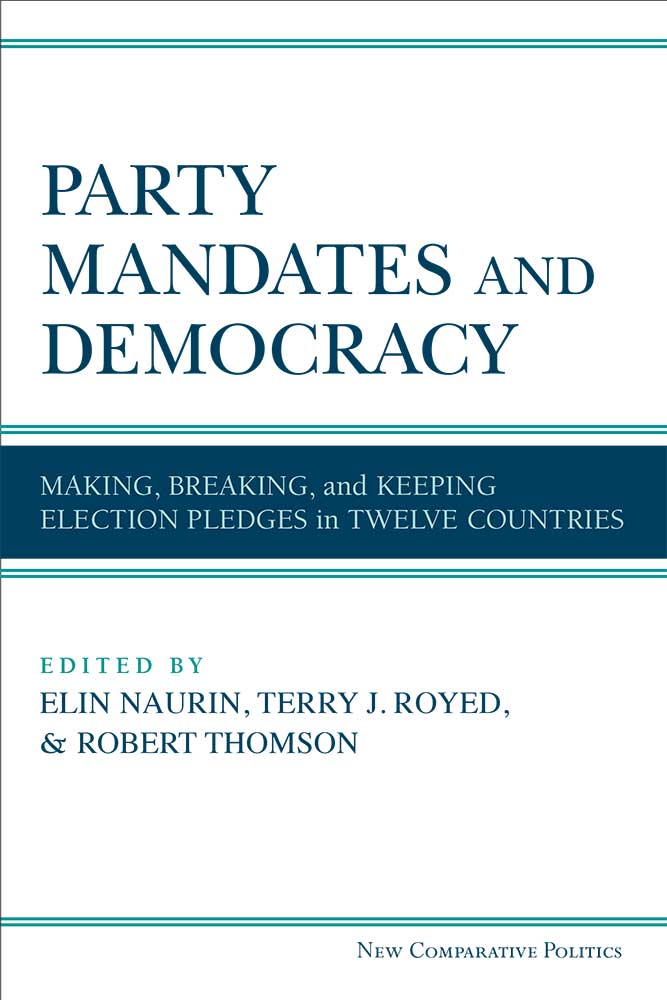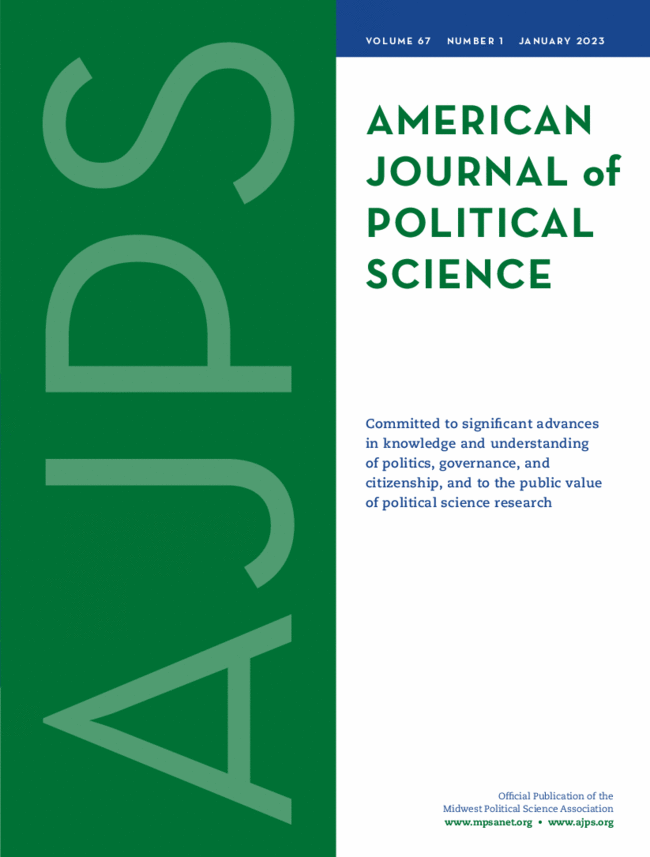Comparative publications by CPP researchers
The main comparative publications of the CPP include a 2019 edited volume, Party Mandates and Democracy, and a 2017 article in the American Journal of Political Science.

Party Mandates and Democracy: Making, breaking and keeping election pledges in twelves countries
Elin Naurin, Terry J. Royed, and Robert Thomson, editors.
University of Michigan Press, 2019.
Party Mandates and Democracy reveals the extent to and conditions under which governments fulfill campaign promises during election campaigns. Contrary to conventional wisdom a majority of pledges—sometimes a large majority—are acted upon in most countries, most of the time.
This book is the first major comparative study of promises across a broad range of countries and elections, including the United States, Canada, nine Western European countries, and Bulgaria. The book thus adds to the body of literature on the variety of outcomes stemming from alternative democratic institutions.
The Fulfillment of Parties’ Election Pledges: A Comparative Study on the Impact of Power Sharing
Robert Thomson, Terry Royed, Elin Naurin, Joaquín Artés, Rory Costello, Laurenz Ennser-Jedenastik, Mark Ferguson, Petia Kostadinova, Catherine Moury, François Pétry, Katrin Praprotnik.
American Journal of Political Science 61, no. 3: 527–42, 2017.
This study provides the first large-scale comparative analysis of pledge fulfillment with common definitions. The study examines the fulfillment of over 20,000 pledges made in 57 election campaigns in 12 countries. It finds that many parties that enter government executives are highly likely to fulfill their pledges, and significantly more so than parties that do not enter government executives. The article also explains variation in the fulfillment of governing parties’ pledges by the extent to which parties share power in government alongside a range of other explanatory factors.

Previous Studies of Election Pledges
The CPP builds on a long tradition of research on campaign promises. Many of these earlier studies focused on single countries and used different definitions of promises. Terry Royed’s study on the US and UK was one of the first studies to adopt an explicitly comparative approach and provide details of how reliable the coding of election pledges is. We list a small selection of these earlier studies below, some of which have become part of the CPP.
Promises and Performances in Australian Politics 1928-1959
Russell H. Barrett
Institute of Pacific Relations, in cooperation with the University of Mississippi, 1959.
In the first recorded in-depth study of election pledges, Barrett collects promises from the election campaign speeches of party leaders in Australia, and analyses their fulfillment, across four decades. Barrett concludes that Australian parties ‘have done a remarkably good job of fulfilling their promises,’ and highlights the role that institutions, such as the High Court, Senate and sub-national governments, have in preventing the fulfillment of promises.
Elections in America: Control and Influence in Democratic Politics
Gerald M. Pomper and Susan S. Lederman.
Longman, 2nd edition, 1980.
Pomper and Lederman examine the influence that voters, parties and elections have on political outcomes in the United States. This study has a particular focus on the content of Democrat and Republican party platforms, including election pledges. Pomper and Lederman show that, far from being indistinguishable, the two major parties offer well-defined and different visions for future government policy. The study also concludes that both parties are competent at fulfilling their election pledges, and therefore a change in party will provide a change in government policy under certain circumstances.
The Influence of Election Programmes: Britain and Canada 1945-1979
Colin Rallings
Book chapter in Ideology, Strategy, and Party Change: Spatial Analyses of Post-War Election Programmes in 19 Democracies. Ian Budge, David Robertson, Derek Hearl (ed.), Cambridge University Press, 1987.
Rallings’ chapter in the influential Ideology, Strategy and Party Change is framed as testing the proposition that party programmes ‘matter’ for government policy. If no policy changes were discernible following a change in government party in the UK and Canada, systems where government parties faced relatively little institutional opposition, the influence of party programmes might be negligible generally. To test this assumption, Rallings uses legislative instruments to assess if ‘specific commitments to act’ in party programmes were implemented or not. Across the several decades of election pledges in the UK and Canada, Rallings finds good reason to suggest that party programmes do indeed influence government policy.
Terry J. Royed
British Journal of Political Science, 26, no. 1: 45–80, 1996.
Royed tests the hypothesis that parties are better able to carry out mandates in Britain than the United States in this study of the Reagan and Thatcher years. The study compiles meticulous inventories of pledges and determines whether or not the pledges were fulfilled. This study laid the groundwork for a systematic and rigorous comparative research program on election pledges. Royed finds that institutional differences between the two countries matter when it comes to bringing about policy change.